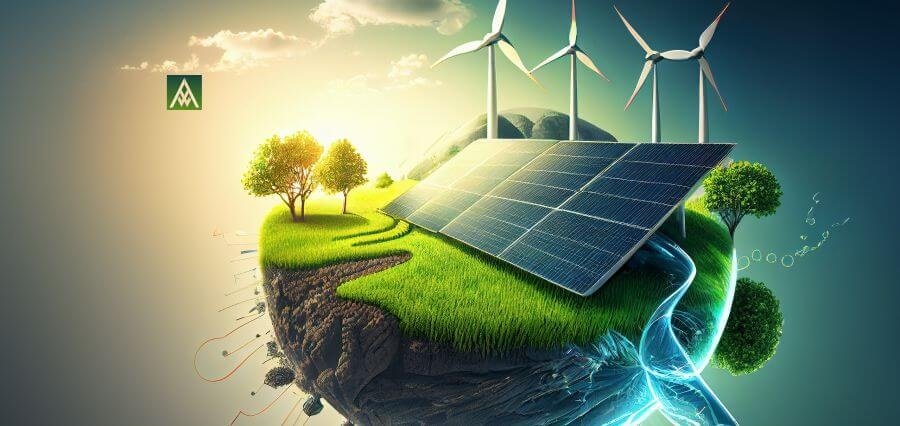Against the global efforts being made to meet the pressing challenge of climate change and degradation of the environment, Arab countries are ramping up their investments in clean energy. Those oil and gas-endowed countries, reliant for so long on fossil fuels for their economic development, have increasingly realized the need for the diversification of their economies to less reliance on such petrol-based resources. First and foremost, this move is of utmost importance to sustainable development. Next, it opens up a huge window to meet economic growth and employment.
The Need for Clean Energy
The Arab region is highly vulnerable to the impacts of climate change. It faces significant impacts on agriculture, health, and other livelihoods from higher temperatures, water scarcity, and extreme weather events. The United Nations estimates that the Middle East may increase average temperatures by as many as 1.5 to 2 degrees Celsius by 2050 with devastating consequences for people and ecosystems. Against such developments, the necessity to invest in clean energy sources like solar, wind, and hydropower has become the inevitable thing to do.
Investment in clean energy sources currently
Some of the most important clean energy investment developments are already being undertaken by several Arab countries. Most prominent among these is the United Arab Emirates (UAE), whose targets to derive at least 50 percent of its energy from clean sources have been set for as early as 2050. Projects like the Mohammed bin Rashid Al Maktoum Solar Park have been initiated, which are expected to produce 5,000 megawatts of solar power by 2030.
Infrastructure-wise, Saudi Arabia is also making massive investments in clean energy under its Vision 2030 strategy. To reduce the dependency on oil and transform the face of its economy, Saudi Arabia has set a renewable energy target of 58.7 GW for 2030. Thus, the construction of the city of NEOM, which combines the most advanced technologies with sustainability practices, makes Saudi Arabia the leader towards a clean future.
Economic benefits of Clean Energy
More than just filling the environmental bucket, investment in clean energy sources also comes with a host of economic benefits. According to International Renewable Energy Agency, the renewable energy jobs in the MENA region could reach 1.3 million by 2030, continuing the present trend. All said and done, such growth in renewable energy technologies would translate into employment opportunities across several sectors, including manufacturing, installation, and maintenance.
Moreover, reliance on clean energy enhances the energy security of the Arab states. Dependence on imported fossil fuels is remarkably minimized, and renewable local energy sources are exploited towards stabilizing energy supplies and prices in a country. Furthermore, this trend is in tandem with the global drift towards sustainability; therefore, these countries receive more foreign investment.
Regional Cooperation
Cooperation among the Arabic nations is thus very fundamental to having the most efficient utilization of investment on clean energy. Organizations, for instance, such as the Arab Renewable Energy Commission are supposed to encourage cooperation and cooperation in implementing renewable energy projects across the whole region. Common knowledge and technology, and best practices can represent differences in accelerating times for each country to move over into sustainable energy systems.
For example, Jordan had recorded great success with the solar projects, which not only fulfilled the energy demands of the country but also exported surplus units of electricity to other countries in the region. The product of the regional cooperation projects may thus be an integrated regional market for energy that accords all the participating nations a fair deal.
Opportunities Ahead
The promising developments however have included a number of clean energy investments. However, several challenges are still seen. One of the significant challenges is the amount of up front capital needed for renewable projects. Costs have decreased substantially during the past decade; for example, the cost of solar photovoltaic declined by around 89% from 2010 to 2020-but financing remains a challenge for most of the countries in the region.
There is a short supply of regulatory frameworks to spur the development of renewable energy in most countries in the Arab states. Subsidization on fossil fuel products continues to characterize many Arab nations whose income from sources such as oil persists at extremely high amounts, cutting competition for cleaner alternatives. Governments will need to devise policies that are assisting the public and private sector’s investment in innovation of clean energy technologies overbarriers.
Technological advancements also contribute a big deal to the efficiency and effectiveness of the clean energy solutions. For example, smart grids and battery storage systems might enhance the supply-demand management of renewable energy. The smart grid and battery storage systems enhance the integration of intermittent sources including wind and solar energy into the existing power grids.
Research and development into future emergent technologies, such as hydrogen fuel cells or carbon capture, will unlock paths to much more sustainable solutions, but education and training programs will be critical in workforce preparation to acquire needed skills for that emerging sector.
Conclusion
Arab countries now have a big chance to decide a safer future ahead by embracing the shift towards clean energy and this is one of the essential steps toward not witnessing devastating environmental issues. Renewable resources can be developed, regional cooperation enhanced, and financial barriers can be overtaken in the way of getting into these aspects as well as embracing technological innovations.
As the demand for clean energy keeps increasing around the world, the countries of the Arab world will be given ample opportunity not only to protect their own environment but also to make a great contribution to the global struggle against climate change. The journey shall be tough, but determination and strategic planning shall, nonetheless, soon see these nations achieving a sustainable future with clean energy running in its veins.




